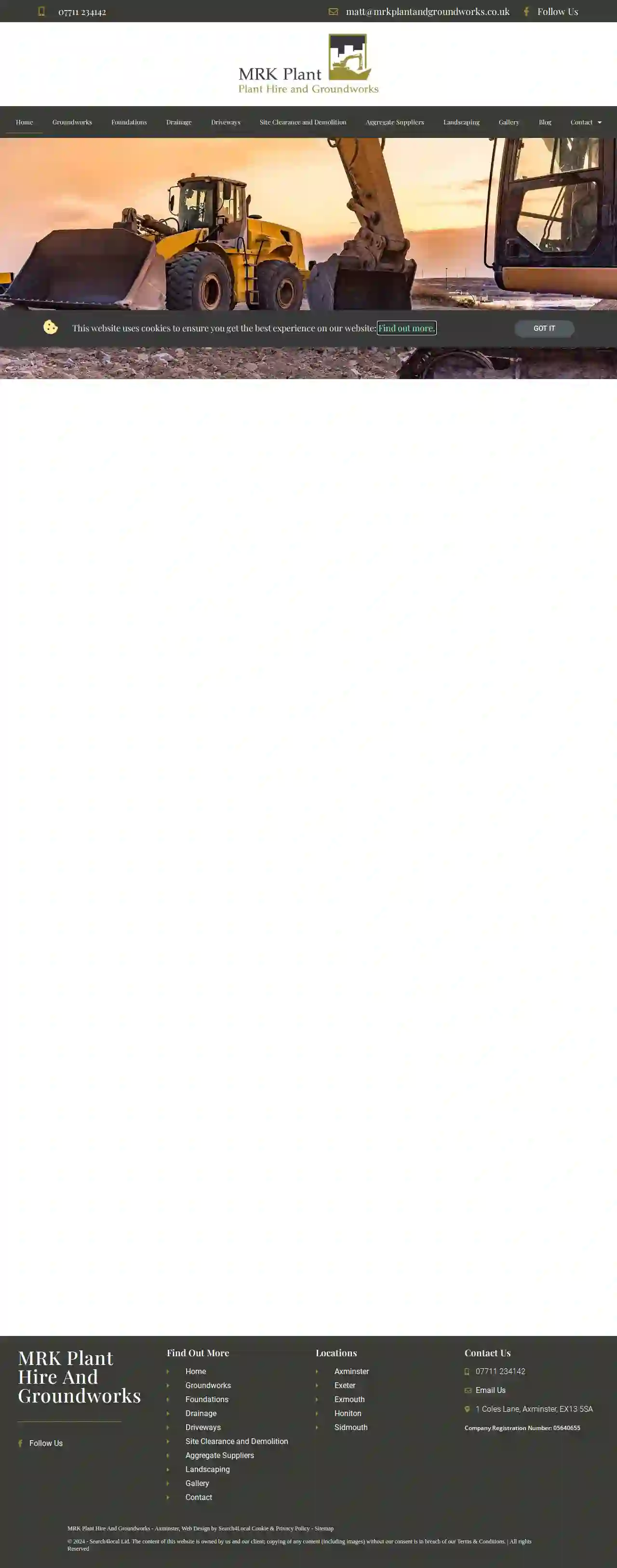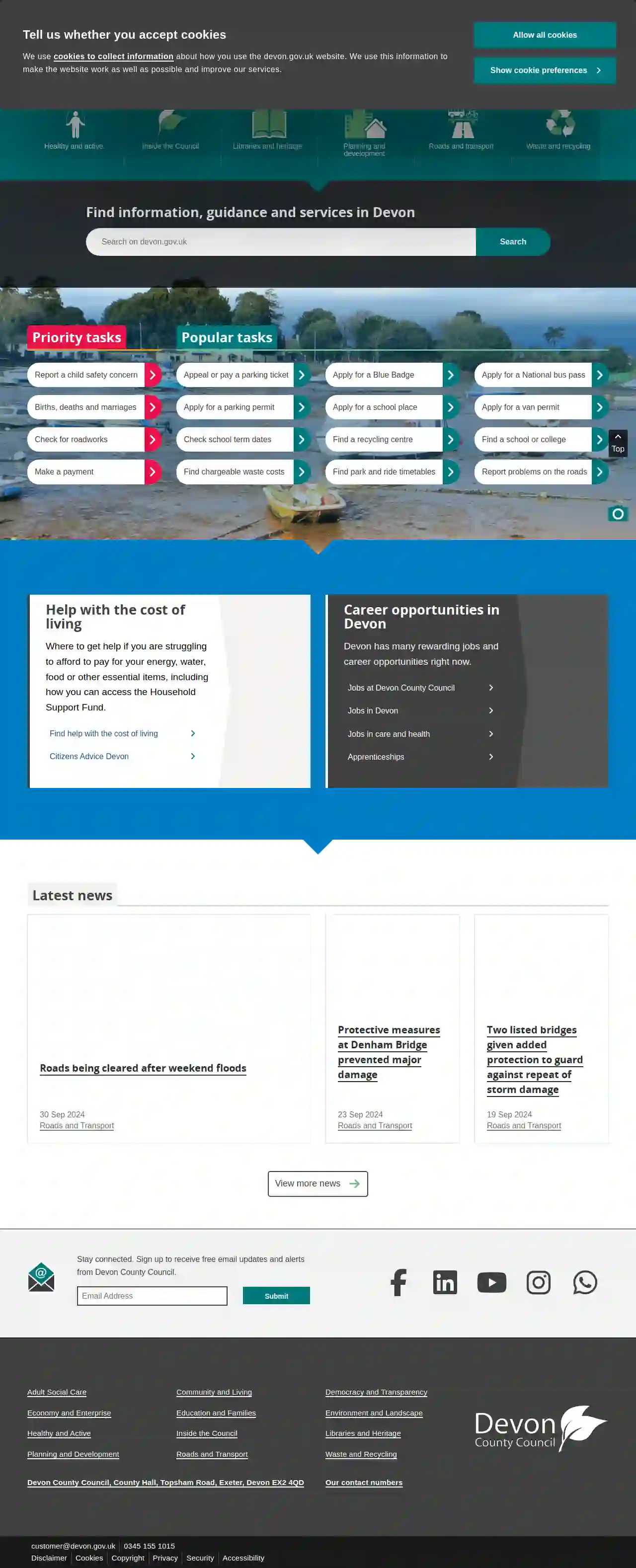Excavation Contractors Exmouth
Top Excavation Contractors in Exmouth
Get 3 FREE Excavation Companies quotes for your project today! Compare profiles, reviews, accreditations, portfolio, etc... and choose the best service.
- Mi
Mills Groundworks Ltd
1Exmouth, GB- Services
- Why Us?
Get Quote - Sw
Switch Groundworks Ltd
51 reviewsExmouth, GB- Services
- Why Us?
Get Quote 
MRK Plant
51 reviews1 Coles Lane, Axminster, EX13 5SA, GBGroundwork Contractors Seaton If you need groundwork contractors in Seaton, look no further than our skilled and qualified team. With 20 years of combined experience, our family-run company covers all aspects of groundwork throughout East Devon. From property foundations to controlled demolitions, you can count on us for exceptional services and competitive prices. We are also trained CPCS operators, so all of our machinery will be handled safely and responsibly at all times on your property.For more information on our services in Seaton, Sidmouth, Honiton and the surrounding areas, get in touch with us today on 07711 234142.
- Services
- Why Us?
- Gallery
Get Quote- St
Steve Hillman Mini and Micro Digger Driver Hire
51 reviewsExmouth, GB- Services
- Why Us?
Get Quote 
Knowle Hill Recycling Centre
3.549 reviewsKnowle Hill Recycling Centre, Exmouth, Knowle Hill Recycling CentreExmouth, EX8 5BP, GBKnowle Hill Recycling Centre Knowle Hill Recycling Centre is a convenient and efficient way to dispose of your unwanted waste. We offer a wide range of services, including: Recycling of a wide range of materials Disposal of chargeable waste A reuse shop where you can purchase reusable goods A van permit system for commercial vehicles We are committed to providing a safe and efficient service for all our users. Our site staff are on hand to provide assistance when reasonable, but they are unable to lift excessively heavy and/or awkward loads. Please ensure that your waste is separated before arriving at the site.
- Services
- Why Us?
- Gallery
Get Quote- PA
PAYNE CARPENTRY LTD
3.34 reviewsExmouth, GB- Services
- Why Us?
Get Quote - Ex
Exmouth Excavations
51 reviewsExmouth, GB- Services
- Why Us?
Get Quote - Ha
Haines Plant & Construction Ltd
1Exmouth, GB- Services
- Why Us?
Get Quote - SM
SMK Services (South West) Ltd
1Exmouth, GB- Services
- Why Us?
Get Quote - Al
Alan Maunder
1Exmouth, GB- Services
- Why Us?
Get Quote
Over 11,537+ Excavation Contractors on our directory
Our excavation pros operate in Exmouth & surroundings!
ExcavationHQ has curated and vetted the Best Excavation Contractors near Exmouth. Find a top & reliable business today.
Frequently Asked Questions About Excavation Contractors
- Project Size and Scope: Larger, more complex excavations naturally take longer.
- Soil Conditions: Rocky or challenging soil types can slow down progress.
- Site Accessibility: Limited access might require more time for maneuvering equipment and hauling materials.
- Weather: Inclement weather can cause delays.
- Permitting and Inspections: Waiting for permits or inspections can extend the timeline.
- Clearly Define the Scope: Outline the project's goals, including the excavation area, depth, grade, and intended use.
- Obtain Necessary Permits: Research and acquire any required permits from your local authorities.
- Mark Utility Lines: Contact your utility companies to locate and mark underground utilities to prevent damage.
- Communicate with Neighbors: Inform your neighbors about the project's timeline and potential noise or disruptions.
- Prepare the Site: Clear any obstacles, such as vegetation, furniture, or structures, from the excavation area.
- Discuss Safety Protocols: Review safety procedures with the contractor to ensure a safe work environment.
How long does an excavation project take?
What is the difference between cut and fill excavation?
Cut: Involves excavating soil from an area where the existing grade is higher than the desired grade.
Fill: Refers to using the excavated soil ('cut' material) to raise the grade in an area where the existing grade is lower than desired.
This method minimizes the need to import or export soil, reducing costs and environmental impact. It's commonly used for site preparation, road construction, and landscaping.
What should I do before excavation starts?
What is the difference between topsoil and subsoil?
Topsoil: The uppermost layer, typically rich in organic matter, nutrients, and microorganisms. It's essential for plant growth and is often darker in color.
Subsoil: The layer beneath the topsoil, containing less organic matter and generally denser. It provides support for roots but is less fertile than topsoil.
During excavation, topsoil is often removed and preserved separately for later use in landscaping, while subsoil is typically used for backfilling or other less demanding applications.
How long does an excavation project take?
- Project Size and Scope: Larger, more complex excavations naturally take longer.
- Soil Conditions: Rocky or challenging soil types can slow down progress.
- Site Accessibility: Limited access might require more time for maneuvering equipment and hauling materials.
- Weather: Inclement weather can cause delays.
- Permitting and Inspections: Waiting for permits or inspections can extend the timeline.
What is the difference between cut and fill excavation?
Cut: Involves excavating soil from an area where the existing grade is higher than the desired grade.
Fill: Refers to using the excavated soil ('cut' material) to raise the grade in an area where the existing grade is lower than desired.
This method minimizes the need to import or export soil, reducing costs and environmental impact. It's commonly used for site preparation, road construction, and landscaping.
What should I do before excavation starts?
- Clearly Define the Scope: Outline the project's goals, including the excavation area, depth, grade, and intended use.
- Obtain Necessary Permits: Research and acquire any required permits from your local authorities.
- Mark Utility Lines: Contact your utility companies to locate and mark underground utilities to prevent damage.
- Communicate with Neighbors: Inform your neighbors about the project's timeline and potential noise or disruptions.
- Prepare the Site: Clear any obstacles, such as vegetation, furniture, or structures, from the excavation area.
- Discuss Safety Protocols: Review safety procedures with the contractor to ensure a safe work environment.
What is the difference between topsoil and subsoil?
Topsoil: The uppermost layer, typically rich in organic matter, nutrients, and microorganisms. It's essential for plant growth and is often darker in color.
Subsoil: The layer beneath the topsoil, containing less organic matter and generally denser. It provides support for roots but is less fertile than topsoil.
During excavation, topsoil is often removed and preserved separately for later use in landscaping, while subsoil is typically used for backfilling or other less demanding applications.